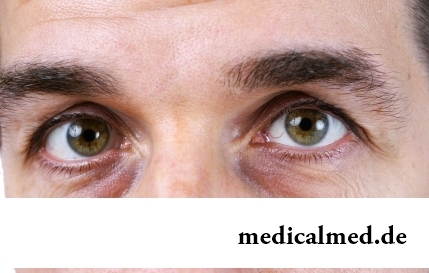





10 myths about hypnosis
Practice of hypnotic impact on consciousness of the person contains about two millennia. During this time scientists managed to learn a lot of things about a phenomenon of hypnosis and learned to facilitate a condition of the patients having heavy illnesses with its help.
Nevertheless, most of the people who do not have a direct bearing on medicine continue to divide delusions not less ancient, than a method of hypnotherapy. Today we will dispel the most widespread myths about hypnosis.

Hypnotists use the help of external forces
About 200-250 years ago even the most successful and talented gipnoterapevta really considered that enter people into a condition of a trance, using assistance of certain mysterious external forces. At the beginning of the 19th century scientists found out what гипнотерапевт is not the trance prime cause. The specialist only helps the patient to concentrate attention, using the techniques acquired for centuries, and falls into a hypnotic condition of people independently.
As confirmation of a conclusion serves that circumstance that for mastering skills of hypnosis of people should not have any special talents. Certainly, some people study practice of hypnotherapy easier and apply it more successfully than others, but it concerns any area of human activity.
In a condition of a trance of people follows any instruction of the hypnotist
Idea of unconditional controllability of the person subjected to hypnosis arose because of the dramatized shows held by not quite conscientious hypnotists, circus representations or movies. Actually in a condition of a trance of people completely understands the events. The hypnotist cannot force the patient to make the actions which are in a conflict with its moral ethical principles or instinct of self-preservation. Stories about how the hypnotized person jumped out of a window or robbed bank – just foolish invention.
After careful studying insolvent were also statements about what in a condition of a trance of people lets out all secrets. For this reason hypnosis did not find application in criminalistics: information obtained from the hypnotized witnesses or suspects often is doubtful.
Hypnosis – a strange and unusual state
There is nothing exclusive in a hypnotic trance. Daily each of us for several minutes plunges into a similar state. It can occur during a trip in transport (the person is slightly disconnected, thoughtlessly looking in a car window), listening to music, readings the interesting book, etc. We consider that we at such moments simply dream or we think, but in practice the condition of our brain is very similar to that which arises under hypnosis.
After an exit from a trance of people does not remember the acts
Most of people remember events which happened to them during the hypnotic session. Sometimes the person forgets about some actions during a trance, but these memoirs are easily recovered.
Under hypnosis it is possible to seize skills of exclusive force
During a trance the attention of the patient is most concentrated. It is really capable of acts which presented to realities for it a certain complexity. Besides, hypnosis helps to be liberated and make that it in a usual condition of people does not decide or hesitates to make.
In this case this is not about any awakening of superabilities, just for the patient an opportunity to make what he is capable also in usual life of is facilitated.
Practice of hypnosis initially pagan and therefore it is condemned by church
The delusion is connected with ideas of use of a trance by shamans and some representatives of nonconventional medicine. Considering what гипнотерапевт does not use the help of external forces and cannot subordinate to itself a free will of the patient, the majority of world religions belong to practice of introduction to a hypnotic trance without condemnation. For example, the Roman Catholic church recognized treatment by means of hypnosis quite acceptable in 1847.
Hypnotherapy in itself does not bear any religious implication. However, it is quite often used by representatives of totalitarian sects in the unscrpulous purposes, but it is impossible to consider because of it unethical a method.
Some people do not give in to hypnosis
The only reason creating impossibility of introduction of the patient to a condition of hypnosis is severe damage of a brain. Qualified гипнотерапевт it is capable to help to concentrate and fall into a trance practically to any person, however a susceptibility to such efforts (hypnotizability) at all people different.
Holding a successful hypnotic session requires active cooperation of the specialist and patient as it is impossible to enter the person into a trance against his will.
It is easy to hypnotize the flabby person
Hypnotizability of the person is not connected with his moral and strong-willed qualities in any way. More likely, here play a role ability to quickly concentrate attention, rich imagination, the developed figurative thinking and high intelligence.
At desire to cooperate with the hypnotist and lack of bias against the method, it is simpler to specialist to enter into a trance of the person smart, widely educated and emotional.

Hypnosis does not influence a physiological condition of the person
In a human body under the influence of suggestion there are changes which are directly not connected with conscious brain activity. For example:
- after suggestion that the patient drank a lot of water, it strengthens release of urine and its density decreases;
- at the patient who allegedly ate several spoons of sugar glucose level increases in blood;
- at suggestion that the patient sees bright light, it shows a pupillary reflex (pupils are narrowed).
Many phenomena such are known and well studied. Practice of use of hypnosis for anesthesia including at band operations is based on existence of biochemical and physiological effects of suggestion. Certainly, medicinal anesthesia is simpler, available and cheap. Hypnotic anesthesia cannot be applied in a mass order as because of deficit of the specialists-gipnologov having rather high qualification and because of a different susceptibility of people to hypnosis. Nevertheless, the possibility of use of a trance when carrying out surgeries allows to give help to people to whom the anesthesia is contraindicated.
You should not forget also that many corporal illnesses in practice have the psychosomatic reasons, and serious illnesses often are followed by decrease in an emotional background. Hypnotherapy gives invaluable help in treatment of such states, saving thousands of patients from sufferings.
For the patient the risk is high not to leave a trance
Any case when the hypnotized person would get stuck in a condition of a trance is not known. If the hypnotist does not stop a session compulsorily, the patient independently is returned after a while to a condition of wakefulness or fills up with quite usual, normal dream.
Concerning hypnosis the set of exotic myths continues to occur. Actually, it is quite safe method of impact on consciousness capable to help the person with many situations.
Caries is the most widespread infectious disease in the world to which even flu cannot compete.

On the head of the person about one million hair follicles, or as they are called still, hair bulbs are located. At the moment he is born...
Section: Articles about health
Such trouble as the milkwoman's attack, at least once in life happened almost to each woman. Prevalence of a disease is explained by the fact that the causative agent of an illness belongs to the so-called opportunistic microflora living on mucous an obol...
Section: Articles about health
Tea is loved and use almost everything. This drink has tonic properties, contains the tannins capable to suppress activity of causative organisms. Recently great popularity was gained by teas with vegetable additives. The medicative herbs, spices and fruit which are a part of such mixes enrich drink with vitamins and microelements, increasing its nutritional value and creating additional curative effect....
Section: Articles about health
The next flu epidemic leads to the next panic, from year to year we give in on these manipulations: professionally alarming goal...
Section: Articles about health
The brain of the person is studied not one hundred years, but the quantity of the riddles connected with this body increases rather, than decreases. Perhaps, numerous delusions concerning a structure and functioning of a brain, many are explained by it from...
Section: Articles about health
Season of activity of viral infections in the heat. Everyone can get sick, but probability of this unpleasant event it is possible and it is necessary to minimize. There is a number of rules, following to which will help or to avoid absolutely infection with flu or a SARS, or to have an illness benign and without essential complications. About ways of prevention of seasonal infections the speech in this article will also go....
Section: Articles about health
Small appetite at the child – the complaint which pediatricians should hear practically from each mother. Most often it is carried to разр...
Section: Articles about health
Popular joke that there are no healthy people, and is nedoobsledovanny, most of us considers an honest truth, continually it is necessary to hear that all of us are sick hardly from a school bench. It is hard to say, whether so it actually because...
Section: Articles about health
Helminthosis is one of the most widespread diseases. Statistically, any species of helminths infected every third inhabitant of the planet. Most of specialists even consider these data strongly underestimated: some uninvited "cohabitants" do not cause the carriers serious troubles, and patients just do not see doctors. The situation is aggravated also with the fact that people know about specifics of similar illnesses very little. At many presence of worms is strong ассоциир...
Section: Articles about health
Radiological methods of a research are applied in medicine more than hundred years, and thanks to them millions of lives were saved. In m...
Section: Articles about health
Heart disease and blood vessels lead to disturbance of blood supply of bodies and fabrics that involves failures in their work, deterioration in health of the person, decrease in its working capacity and standard of living. Annually such perishes from pathologies more...
Section: Articles about health
Stability of a hormonal background is one of the most important conditions of preservation of health of the woman. At the same time endocrine system – the thin device extremely sensitive to any external influences. Changes of a way of life (for example, a diet), emotional stresses, infectious diseases, reception of some drugs can become the reason of hormonal failure. Besides, work of hemadens has the natural specifics in certain moments of life: on various St...
Section: Articles about health
Bathing in broths of medical flowers and plants (phytobathtub) was eurysynusic since Cleopatra who is a good judge of everything...
Section: Articles about health
Zone hypostases under eyes - very widespread problem giving to people is a lot of inconvenience. Hypodermic fabric in these parts has very loose structure and almost does not contain collagenic fibers. Besides, the skin covering подглазья constantly is exposed...
Section: Articles about health
Statistically cystitis 25-30% of women up to 40 years have. With age this indicator raises, besides many do not get to statistics because do not see a doctor. The most sad that after the regular visits to doctors, long reception of antibiotics and life in the mode "it is necessary to take care" cystitis all the same is returned to a half of women. Symptoms of cystitis are unambiguous and it is impossible to confuse them with anything: bladder pain, burning at an urination, frequent desires to go to a toilet, a vynuzhd...
Section: Articles about health
According to doctors, more than a half of men of 25-50 years suffer from frustration of the urinogenital sphere, but sees a doctor from them меньшинс...
Section: Articles about health
Wood louse – the ordinary-looking unpretentious plant extended in all territory of our country. It quickly expands, and sometimes fills sites, bringing a lot of chagrin to gardeners. Perhaps, they would be upset less if knew that the wood louse is the prices...
Section: Articles about health
Modern footwear is extremely various. It stopped being only protection for legs long ago. Today shoes, boots, barefoot persons choose not so much proceeding from their convenience and functionality how many being guided by outward, brand and an opportunity to add with them a stylish dress. At the same time, buying footwear, think of its safety a little. Meanwhile, many popular models can do essential harm to health....
Section: Articles about health
People know that thermal sources have salutary force long ago. Treatment by natural waters is one and...
Section: Articles about health
Striya (extension) are the defects of skin having an appearance of direct or wavy strips from 1 to 10 cm long and 1-5 mm wide. In most cases at women of a striya are located on a stomach, hips, a breast or buttocks. At athletes they can appear on shoulders and внутренн...
Section: Articles about health
The varicosity has familiarly many, statistically, this disease more than a half of all adult population. As a rule, the varicosis affects preferential superficial vessels, and is shown by characteristic cosmetic defects. The deep vein thrombosis as this illness at the initial stages can imperceptibly proceed is represented much more dangerous, and in the started cases threatens with serious danger – thrombosis. This state, when the blood clot formed...
Section: Articles about health
For the time being the perspective of heart diseases seems to most of people remote and foggy. But sooner or later практичес...
Section: Articles about health
The kid who was recently born is surrounded with love of adult family members and their cares without which the baby cannot exist. Some parents consider that gentle attachment and caress are quite enough that the child correctly developed and was happy...
Section: Articles about health
The state of health of the person in many respects depends on chemical composition of biological liquids of an organism. Specialists consider that PH value of these solutions has to be in range of 7,35-7, 45. The deviation in the smaller party (so-called "acidulation") is fraught with development of many heavy illnesses, failures in work of immune system, decrease in working capacity and deterioration of life. To avoid serious fluctuations of acidity of internal liquids it is necessary to adhere разумног...
Section: Articles about health
The climax, or menopause is the normal process of the termination of genital function of the woman which is followed serious hormonal...
Section: Articles about health
The dietology, as well as other sciences, does not stand still. Food stuffs are exposed to comprehensive study, and scientists obtain new information on their properties and influence on a human body. Unfortunately, this reasonable and natural process from time to time д...
Section: Articles about health
The state of health of the person depends on many factors. One of the most important is the constant, but not exhausting a physical activity. In the presence of various illnesses specialists often advise patients to do swimming which by right takes the leading place by efficiency of improvement, having at the same time a few contraindications. Today we will talk about the main directions of therapeutic impact of swimming on a human body....
Section: Articles about health
